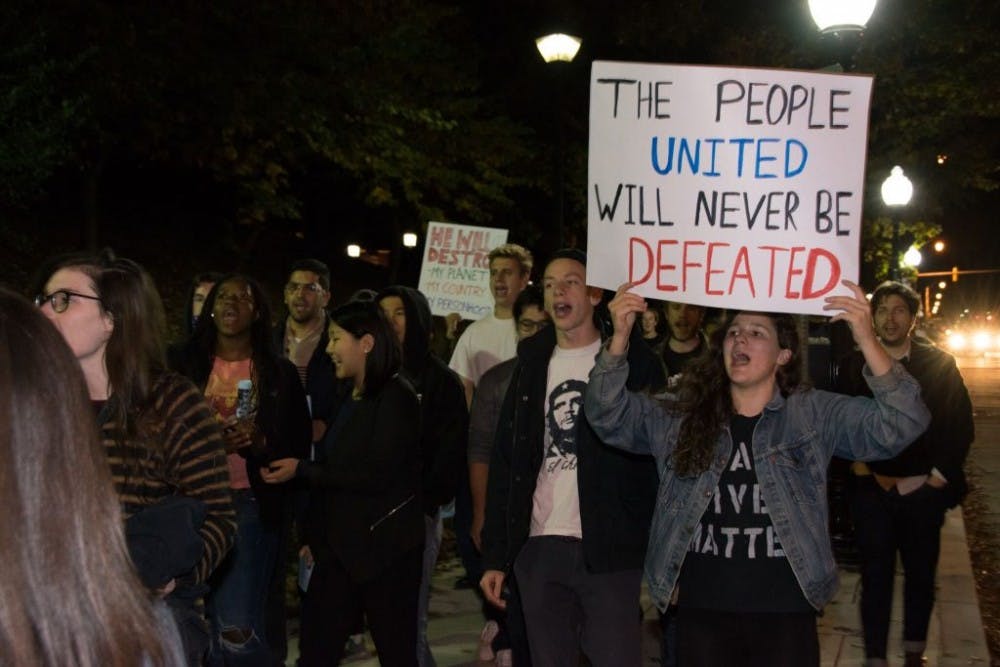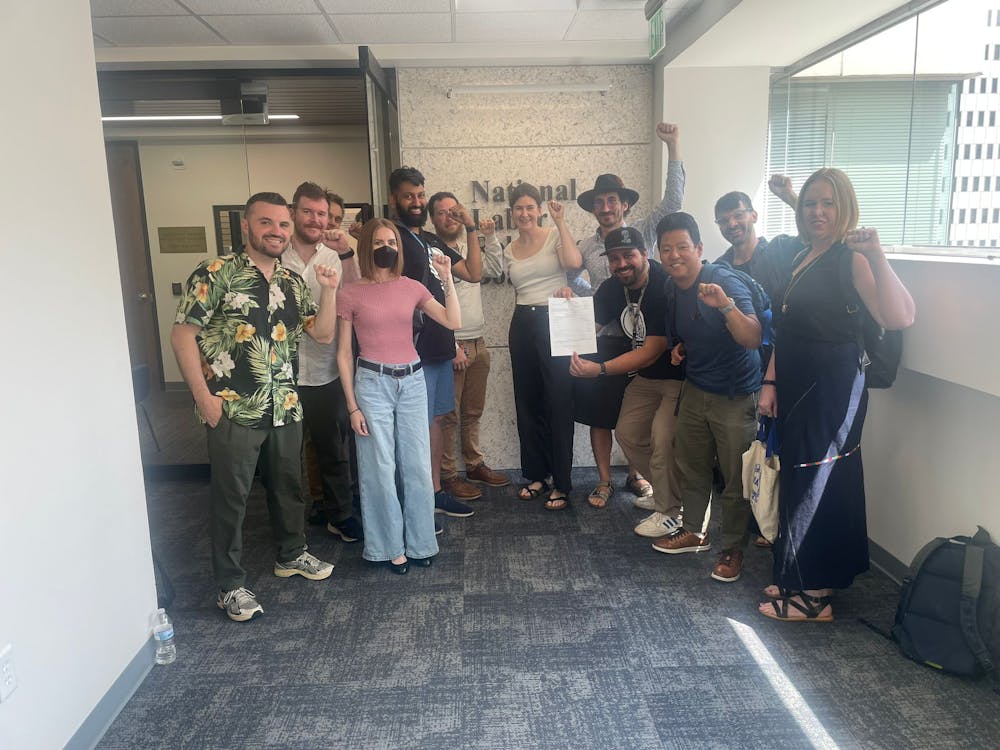More than 100 Hopkins students gathered on the Beach last Thursday to protest Donald J. Trump’s victory in the Nov. 8 presidential election.
The demonstration titled “Hopkins Against Hate” was organized by 20 student groups, including Students for a Democratic Society (SDS), the Black Student Union (BSU) and Hopkins Feminists.
Since Trump’s victory, thousands of Americans have taken to the streets in cities across the country, expressing their opposition to a Trump presidency.
Matthew Brown, the alumni relations chair of the BSU, stressed that Thursday was just the beginning of a growing movement.
“This is a draining process, and it’s not a sprint; It’s a marathon. We are going to be in this for four years, and we need to make sure that every step of the way we are healthy and ready to go and ready to fight for what we believe,” Brown said. “We can only do this together, as a united group against Donald Trump and his hatred.”
Joining the original group of protesters, approximately 200 more students and other members of the Hopkins community held signs while they marched down N. Charles Street, shouting anti-Trump chants like “No Trump, No KKK / No more racist U.S.A.” and “Say no to hate, say no to fear / Immigrants are welcome here.”
Other students held signs which read “Love Will Trump Hate,” “Say no to Fascism, Dump Trump” and “P*ssy grabs back.”
As the protesters walked toward the Inner Harbor, cars honked in support, and bystanders clapped and cheered in response. Hopkins security blocked off side streets and followed the protesters until Penn Station.
Once at the Ynot Lot in Station North, the Hopkins student march combined with a city-wide protest of at least 1,500 people. Some of the groups present were the Peoples Power Assembly, the Workers World Party and Black Lives Matter activists.
“We all have huge differences, but we are here tonight because we are angry,” one organizer said.
Another speaker emphasized how important it is to reject Trump’s divisive strategies.
“We are all unique and united. Why do you think we’re called the United States?” the organizer asked.

People held signs and chanted as the protest stopped downtown rush-hour traffic. One Maryland Transport Authority bus driver honked her horn in support as protesters cheered.
“The people, united, will never be divided!” marchers chanted.
The protest continued past Penn Station to Mount Vernon, where an organizer advised protesters to be cautious.
On the way downtown, a Trump supporter yelled obscenities from the sidewalk.
Some marchers called back, as the protest continued toward the Inner Harbor, where the demonstrators gathered for an open mic.
One young Baltimorean from an Egyptian immigrant family shared his fears about a Trump presidency.
“My sister should not have to ask me to go to the mall with her because she is too scared to wear a hijab,” he said.
From the Inner Harbor the protestors marched toward M&T Bank Stadium and then back to Ynot Lot, where the protest began.
Following last week’s protests, the reactions on campus have been mixed. Some students have been inspired, while others are concerned that it may deepen the current divide in the American political climate.
Hopkins demonstrator freshman Victoria Li discussed some of the small moments that moved her during the protest.
“We marched past this well-lit classroom of third or fourth graders and they all had their faces pressed to the windows and they were watching the march. And everyone who walked by waved at them and cheered,” Li said. “That was a little symbol that the younger generation is watching and that we had to set an example for them and ensure that their futures are not endangered.”
Alizay Jalisi, a member of Hopkins Feminists, stressed how important it is to speak out. As a Muslim woman whose family is from Pakistan, she feels personally threatened by Trump’s rhetoric. For her, the protest was a constructive outlet for frustration while also serving as a way to mobilize people who feel targeted by Trump.
She explained how the protest disrupted people’s daily activities, drawing more attention to the concerns that she and her fellow protestors wished to vocalize.
“As a person who is not white, I can be frustrated with white people because a lot of white people voted for Trump, especially white women. A lot of the people who gave poor responses or who looked away or ignored us were coincidentally white,” she said. “I felt that I was forcing them to look beyond their privilege and pay attention to me and the fact that my identity matters.”
For Hopkins demonstrator Sarah Wolfe, the protest was a great opportunity to come together with the Baltimore community and show people who feel marginalized and threatened that they are supported.
“It took me until after the election and after the results to realize that I needed to be more active. I can’t just vote, I need to make my voice heard in any way,” she said.
Wolfe highlighted the need to become more active in local communities and said that joining activist groups and participating in their efforts is a good way to start.
Junior Anna Bartoli was disappointed by the election results and believes that the protest was a good sign of unity. However, she worries that protesting Trump’s election can impede the healing of national divisions.
“I think that protesting after the election’s been done has a tendency to alienate and divide people more,” Bartoli said. “That’s what led to this election in the first place, ignoring the reality of 60 million people’s thoughts and making an enemy out of everyone who doesn’t think the same way.
Bartoli explained that she would not expect people who feel victimized by Trump’s remarks to empathize with him or his supporters, but emphasized that his supporters are not a monolithic group.
“I do think that it’s important to take seriously the demands of those who did vote for him and acknowledge the reasons why they did,” she said. “And think about what that actually means instead of just saying there’s one reason why people did it.”
Freshman Alexis Nelsen agrees that the protests productively express disappointment. She highlighted the need to remain outspoken about much of the misogyny and racism that has characterized Trump’s campaign.
Nonetheless, Nelsen disagreed with one of the phrases chanted during the protest: “Not my president.”
“The electoral college might be a flawed system, but [Trump] was democratically elected by half of the people who went out to vote, and denying that is no way to fix this problem.” Nelsen wrote in an email to The News-Letter. “Trump is a symptom of a disease — responding with more outlash seems like it will hurt the nation even more.”
Nelsen then called on students to reach out to those who do not share their views.
“Nothing is going to change if we remain in this bubble of liberalism and confirmation from people we already know agree with us. That’s only going to push people even further toward the extreme,” Nelsen wrote.
Wolfe responded to such concerns by stressing that she does not believe people were protesting the democratic process.
“People think that we were protesting in denial of Trump becoming our president. I don’t think that is what it was,” she said. “I think we’ve accepted he’ll be our president, we’re not questioning democracy or the system.”
Jalisi believes that people have a duty to voice their concerns about the implications of a Trump presidency for different strata of American society.
She spoke about how she draws inspiration from a quote by Archbishop Desmond Tutu which says, “If you are neutral in situations of injustice, you have chosen the side of the oppressor.”
“If we as people who feel marginalized or are a minority group in this country did not voice our concerns, then that would be us becoming complacent and feeding into the white patriarchal rhetoric that rules this country,” Jalisi said. “That pretty much is what led to [Trump’s] election.”
Rollin Hu and Sarah Y. Kim contributed reporting.





